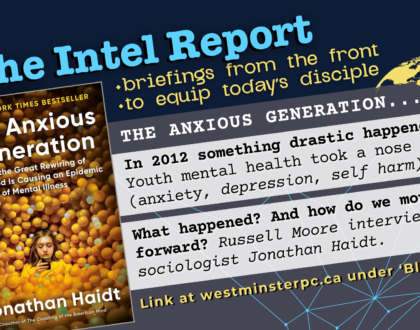Proactively preparing for what could be the worst month of your life

by Westminster
By Pastor Ruttan. Originally posted on MatthewRuttan.com
January is bad—even in a good year. This year is potentially worse. Okay, probably.
We are battling the dreaded “second wave” of the COVID-19 pandemic. Christmas is in the rear view mirror, bills have piled up, the belt buckle is tighter than we’d like to admit—oh, and its cold outside… and seasonal affective disorder is real… and we just entered another lockdown. #GoodTimes
Things that gave us joy like gathering with friends and family, singing alongside our brothers and sisters during worship, or trips to the arena, are now muted or cancelled.
All of this is why I think you should be proactive—not reactive—about your well-being for January.
From what I’ve seen, most people wait until they are very unhealthy before they take steps to be healthy again. But imagine a well that has been dug in the middle of a field. Based on my experience, it’s easier to stay out of a well than to climb out of one.
So let’s stay out. Here are some suggestions. Perhaps a few of them will be useful.
1. Reverse inertia
Inertia seems to attract darkness. So go for a walk or run, and breathe in some fresh air in the process. It doesn’t really matter what you do as long as you do it. Do you remember all those things you’ve heard about mental health being connected to physical health? Yeah, that.
2. Grace
Honestly acknowledge how difficult January is going to be. Don’t beat yourself up when things don’t go as planned because they probably won’t. And don’t be too harsh with others either. We need to extend the same grace and understanding to others that we ourselves need.
No one is at their best. No one is living their Plan A. And no one tires of hearing a word of encouragement. Live grace.
3. The Frenemy
Friend + Enemy = Frenemy. Google defines it thusly: “a person with whom one is friendly despite a fundamental dislike or rivalry.” Usually we apply this term to people. But I’d like us to apply it to… the internet.
It’s our public frenemy number one.
I seriously think we all need to limit our time online—or at least use it a lot more wisely. Sure, we can get some groceries, order a new book, and message our best friend. But the online world is increasingly dark and misleading. Doom scrolling, constant comparison to others, rabbit holes that are baited with deceptive half-truths, news that isn’t really news—and the resultant depression and anxiety—are all wise warnings to take a step back from the frenemy, whose grip around your heart is tighter than you know.
Personally, I’ve set up ‘blackout’ times when I don’t go online, and I recently took Instagram and Facebook off my phone. The ball was cut from the chain. Sweet, blessed calm and hallelujah.
4. Help
Reach out for help, and don’t be afraid or embarrassed to do so. Sure, you can wait until you hit rock bottom. But wouldn’t it be less painful if you planned ahead and reached out to someone? Maybe it’s a professional. Or maybe it’s simply time with a trusted friend to talk or pray. “As iron sharpens iron, so one person sharpens another” (Proverbs 27:17).
5. Set a simple, reasonable goal
This idea is from my ever-insightful wife, Laura. If a goal is too lofty, we might not get there in one of the worst months of our lives—and then we’ll just have one more reason to feel bad. But if it’s reasonable and doable, we’ll be motivated to make it—and then we’ll have a reason to celebrate when we do!
When you have it in mind, commend it to God’s use: “Commit to the LORD whatever you do,
and he will establish your plans” (Proverbs 16:3).
Is there a simple, reasonable goal that could move you in a healthy, positive and faithful direction?
6. Stand firm in things eternal
Consider David’s words in Psalm 18:2: “The LORD is my rock, my fortress and my deliverer; my God is my rock, in whom I take refuge, my shield and the horn of my salvation, my stronghold.”
Friends, you might feel like you’re playing hurt—but God isn’t. If, as it says in 2 Peter 3:8 that with the Lord a day is like a thousand years and a thousand years are like a day, then from God’s perspective the COVID-19 pandemic has been going on for about 72 seconds.
God continues to be all-powerful, all-knowing, and on his throne. He is not surprised by what is happening. He is in control even when you feel out of control. He is the same yesterday, today and forever. When you are wobbly, he is the one you want to lean on, learn from, and look to for hope.
Worship weekly, pray continually, read the Bible consistently, and love one another. Stand firm in things eternal.
“And the peace of God,” says Paul in Philippians 4:7, “which transcends all understanding, will guard your hearts and your minds in Christ Jesus.”
Recommended Posts

10 Unpopular things Jesus said
July 23, 2024

The Intel Report No.2 – Demons, Possession & Exorcism
July 17, 2024
